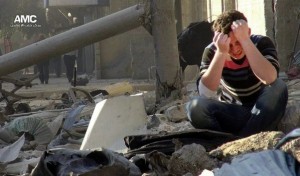Special to WorldTribune.com
LONDON — A leading Western think tank has assessed that the Middle East would continue to be turbulent in 2014.
The International Institute for Strategic Studies determined that war and revolt would plague much of the Middle East over the coming year. In its annual assessment, the London-based institute warned of surprises that would require a flexible strategy.

“Last year was, we said, ‘the year of living tactically'” institute director-general John Chipman. “There is little sign so far that 2014 will be greatly different.”
At a briefing on Feb. 6 to release the institute’s Military Balance, Chipman cited intensified warfare throughout the Middle East, including Iraq, Libya and Syria. He said Iraqis were being displaced by the Al Qaida offensive, which resulted in a revolt in the Anbar province last month.
“Internal population transfers are taking place in Iraq on a scale reminiscent of the start of civil war in 2004–05,” Chipman said. “With elections due in April, continuing violence places a greater burden on the capabilities of the Iraqi security forces. Should violence increase still further, their ability to maintain control could be imperiled.”
The institute played down the prospect of a victory by President Bashar
Assad over Syrian rebels in 2014. The assessment acknowledged a
transformation of Assad’s military with massive help from Iran and Russia.
“The armed forces began to transform, organizationally and doctrinally,
to fight an insurgency in a largely urban environment,” the institute said.
“Still, the regime has not seen a major victory in the last nine months.”
IISS also forecast the continuation of an arms race between Iran and the
Gulf Cooperation Council. Chipman said the six-member GCC was preparing for
a nuclear Iran, already with the largest ballistic missile arsenal in the
Middle East.
“As such, missile defense remains a key priority area for Gulf states,”
Chipman said. “There is an emerging recognition of the need to coordinate
regional capabilities in this area. Qatar, Saudi Arabia and the UAE [United
Arab Emirates] have bought, or are buying, Western missile- and air defense
and strike systems, including stand-off air-launched munitions. As the
regional strategic environment evolves, an important question is whether GCC
states are able, particularly in the air-defense sphere, to work towards greater
coordination.”

You must be logged in to post a comment Login